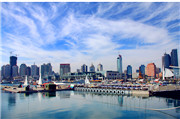A Chinese sailor navigates extremes
( Xinhua )
Updated: 2013-05-24
|
|||||||||
RIDING OUT THE STORM
Sailing has been Guo Chuan's life over the past decade, but it hasn't always been easy. "It has made me suffer from loneliness, desperation and a nervous breakdown, but I never gave up."
After dealing with equipment failures, barrages of fishing nets, fast-moving tropical storms and a no-wind situation during the first two months of his around-the-world voyage, low temperatures combined with high humidity posed new challenges as Guo approached the Strait of Magellan south of mainland South America in January.
"Wind from the South Pole was bone-rattling cold, and the sun hid behind clouds for weeks, leaving the whole world dreary and lifeless," Guo recalls. "I reached Cape Horn in a state of desperation on the night of January 18."
Notorious for treacherous winds and huge waves, Cape Horn, located at the southern tip of South America, has been the site of 500 shipwrecks and the deaths of more than 20,000 sailors throughout history. It is sometimes called "the Mountain Everest of sailing."
"That night was my weakest time of the whole voyage," Guo says.
He lights a cigarette, takes a deep drag and slowly lets out a stream of smoke before continuing, "I hadn't changed clothes for two weeks and they were all sticking to my skin, wet. The whole night, I curled up at the corner of the cabin, which actually became a water cell, wishing that time could move faster."
"The cold, loneliness and helplessness almost killed me, but an inner voice kept telling me, 'Stick it out! Make it home!'"
Guo admits that he would have given up that night, had it not been for a powerful, life-changing event four years earlier.
In 2008, Guo was recruited as a media crew member to participate in the nine-month around-the-world Volvo Ocean Race. Most of his fellow sailors aboard the Green Dragon had participated in the Olympic Sailing Regatta, including five gold medalists and three silver medalists.
"We ate dehydrated food and slept only several hours a day. The ocean was so unpredictable in some waters that we had to be ready for storms that could occur at any time," he recounts.
However, for Guo, the mental anguish was far worse than any physical trial. Working with his fellow top professional sailors, Guo felt like a student facing 10 professors.
"I was quite nervous and depressed due to the language barriers and my inferior sailing expertise," Guo recalls. "I couldn't blend into their circle in the beginning, and I felt that I was like an idiot. What's worse was that I had no place to be alone."
This stress kept him awake at night, but it also prodded him along in the voyage. "I even wished that something bad happen to our boat, so I could quit."
When the boat finished the fourth leg of the race, Xiao Li, now Guo's wife, found Guo on the verge of collapse.
"He was numb, with no smile for anybody and no hope for life," she says. "He finished three bowls of noodles in front of me, not stopping, without looking up, not saying a word. I couldn't bear seeing him like that."
Her care and affection, however, warmed Guo's heart, and he decided to return to the Green Dragon and finish the race, no matter how difficult that may be.
"I went to the doctor and took medication to help alleviate my symptoms. I had to save myself by sticking it out, or I would regret it and despise myself for the rest of my life."
The adversities he faced in the Volvo Ocean Race in 2008 almost destroyed him, but they also forged him into a mature sailor with inner strength. "True inner strength is more crucial in ocean sailing than energy and skills."




